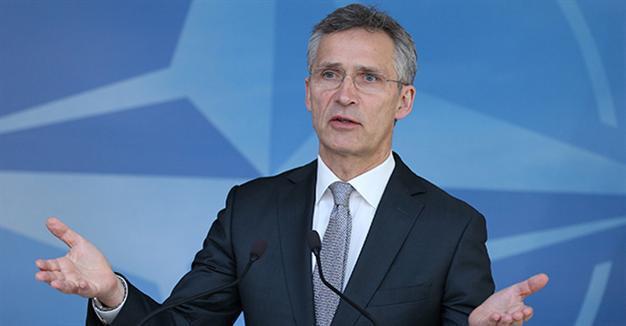NATO backs Turkey against ISIL attacks
Emine Kart - ANKARA
 Days after President Recep Tayyip Erdoğan accused the international coalition battling the Islamic State of Iraq and the Levant (ISIL) in Syria of leaving his country to fight the jihadists alone on its own soil, NATO has expressed solidarity with Turkey in the face of regular attacks on a Turkish border province by rockets fired from jihadist-controlled areas in Syria.
Days after President Recep Tayyip Erdoğan accused the international coalition battling the Islamic State of Iraq and the Levant (ISIL) in Syria of leaving his country to fight the jihadists alone on its own soil, NATO has expressed solidarity with Turkey in the face of regular attacks on a Turkish border province by rockets fired from jihadist-controlled areas in Syria.Foreign Minister Mevlüt Çavuşoğlu initiated a telephone conversation with NATO Secretary General Jens Stoltenberg on May 9 while in Paris, where he also held a bilateral meeting with U.S. Secretary of State John Kerry, as both Çavuşoğlu and Kerry attended talks on the conflict in Syria, Turkish diplomatic sources told Hürriyet Daily News.
“During the contact which was held upon our request, threats directed at our country from Syria have been dealt with. NATO Secretary General Stoltenberg has extended his condolence wishes for those who lost their lives in rocket attacks directed at Kilis and has emphasized that NATO is in solidarity with our country,” the same diplomatic sources, speaking under customary condition of anonymity, said.
The southeastern border province of Kilis, which lies just across the frontier from ISIL-controlled territory in Syria, has been regularly struck by rockets in recent weeks, killing about 20 people and wounding 70 more, according to the state-run Anadolu Agency.
Turkey’s appeal for closer cooperation from its allies against ISIL attacks was also a subject of the Paris meeting between Çavuşoğlu and Kerry.
“During the meeting held with Kerry, the particularity that ‘friendly and allied countries need to be in closer cooperation on the issue of Daesh [ISIL] terror’ was emphasized,” the diplomatic sources said. “Mr. Çavuşoğlu and Mr. Kerry compared notes on also having this issue on the agenda during the NATO Foreign Ministers meeting, which will be held next week,” they added.
Along with Çavuşoğlu and Kerry, representatives of the European Union, Saudi Arabia, United Arab Emirates, Qatar and Jordan as well as Riyad Hijab, the head of the Saudi-based High Negotiations Committee (HNC), gathered in Paris in an effort to relaunch the Syrian peace process.
The Turkish military usually responds to rocket attacks in Kilis with artillery barrages into northern Syria, but officials have said it is difficult to hit mobile ISIL targets with howitzers. Turkish officials have said they need more help from Western allies in defending Kilis and the border.
“None of those who claim to fight against Daesh in Syria have neither inflicted as many losses on it as we have, nor have they paid as big a price as we have,” Erdoğan said in a speech on May 7. “They left us alone in our struggle against this group that hurts us with suicide bombings and attacks on Kilis.”
Kilis is about 60 kilometers north of Aleppo - Syria’s embattled, biggest city and a big prize in the more than five-year-old civil war - and is sheltering about 110,000 Syrian refugees.
Meanwhile, upon his return to Ankara, Çavuşoğlu hosted on May 10 the chair of the American-Turkish Council (ATC), James L. Jones, also the former commander of the U.S. European Command and Supreme Allied Commander Europe and a former National Security Advisor.
Çavuşoğlu and Jones exchanged views on bilateral relations between Ankara and Washington, as well as on regional developments, the diplomatic sources said.
















